Taking stock of the UK’s Seventh Carbon Budget
The latest carbon budget, released by the Climate Change Committee (CCC) on 26 February, highlights electrification and private sector financing as crucial for reducing emissions.

Our Future of Transport Index shows that electric vehicles remain key to the UK’s transition to a net zero economy, but there are still challenges to overcome

A global transition to electric vehicles is essential, but it won’t be easy. In the UK the transport industry has made every effort to reduce its harmful emissions and boasts decent progress: in October 2023, the 50,000th electric vehicle charging point opened in Weston-Super-Mare.1 And as of the end of January 2024 there were around one million fully electric cars on UK roads too.2
But despite this the sector remains the largest emitter of UK greenhouse gases. In 2021 alone over a quarter of all UK emissions came from transport, and the number grew in 2022 according to figures from The Office of National Statistics.3
The fact is, without the mass adoption of electric transport, the UK will likely miss its net zero emissions target. In addition, along with improving air quality, the decarbonisation of UK vehicles will also positively impact the economy – creating new jobs in an exciting and modern new sector, so it's vital the target is met.
Last year, our Future of Transport Report shared, for the first time, the opinion of UK drivers and fleet drivers in a way that told a compelling story about the changing nature of the transport industry.
Recently we launched the second instalment of the report which lets us tell the next chapter of the electrification story.
The Future of Transport report brings together timely insight into the opinions, experiences and intentions of UK drivers and fleet managers operating in businesses across the economy.
Things have moved at a rapid pace since our last report. In fact, our latest data shows that the number of electric and hybrid vehicles exceeded 1.5 million in October 2023.4 However, while this is of course good news, it’s also worth mentioning that car sales are once again on the rise post-covid, with UK registrations skyrocketing by 18% last year and most of these vehicles being petrol or diesel.
Interestingly our research also revealed that the UK Government’s delay on the ban of the sale of petrol and diesel cars has not had a net negative impact on consumers desire for EVs. In fact, around a third of the 1,214 private drivers surveyed said they were now more likely to switch to electric, while 20% said they were less likely and just over half told us they were not changing their plans.
Almost 60% of participants cited the expense of an EV as the main factor preventing them from switching. And just over half mentioned the availability of charging points as a major factor, with just over 40% pointing towards logistics and cost of installing charging infrastructure at home.
Amongst fleet managers, communication also proved to be a concern. Just 45% of those surveyed said they felt they had the information they needed to decide if EVs were the correct choice for their fleets. And a third expect leasing providers to provide better information on switching.

When it comes to more sustainable forms of transport, our data shows that businesses are currently leading the way. Indeed, of the 100 UK fleet managers who took part in our survey, 86% said they had either maintained or increased the number of vehicles in their fleet over the previous 12-month period – up 66% from the last survey.
Over half of participants told us they felt that adoption of EV fleets was an important step towards fulfilling their sustainability commitments. And half said that implementing EVs gave them better sustainability credentials – especially when responding to tenders.
But while the average proportion of EV fleets dipped from 44% to 39%, it’s important to remember that total number of car sales were bounced back during 2023, and so this reduction must be seen in this context.

“86% said they had either maintained or increased the number of vehicles in their fleet over the previous 12-month period – up 66% from the last survey.”
Last year, we were clear about what we needed from the UK Government. Those asks, combined with other government actions, saw the early adoption of electric cars take off. However, there is still work to do for vans. And policy needs to stay very consistent if we are to see an environment which will provide the certainty, stability and incentives for mass adoption of electric vehicles.
Given all of the above and the unique position Lloyds Banking Group, as the parent company of Lex Autolease, has in enabling this transition, we’ve identified the following policy asks:
As Britain’s leading fleet business, Lex Autolease has a responsibility and an obligation to help businesses transition to their sustainable future. Last year, Lloyds Banking Group provided £1 billion worth of new funding EVs and plug-in hybrid vehicles5 – with low emissions vehicles now accounting for almost 50% of the deliveries made by Lex Autolease.
At the time of writing, the Group finances one in ten new electric vehicles through Lex Autolease and Black Horse, and our ambition is to have lent £8 billion worth of EV financing by the end of 2024. It’s a big goal – but one we absolutely must meet. We’re helping to set the agenda because we understand that the decarbonisation of transport is vital to the UK’s ability to halt climate change and ensure our future prosperity.

Managing Director, Lex Autolease
Nick joined Lloyds Banking Group in April 2006 as part of the Retail Division of HBOS. Here Nick led the change agenda across all products areas through unprecedented levels of change. His role spanned merger process to form Lloyds Banking Group; leading the integration of the two heritages mortgage businesses; supporting the divestments of TSB and Sainsbury's; extensive regulation changes and leading the growth change agenda for Retail following the first Group Strategic Review.
Since then, Nick evolved as a technology leader and took on a number of roles such as transforming the Group’s Digital business into a world class eCommerce capability (2014 to 2017), leading the technology transformation for our Commercial Banking and Business division (2017-2019), and held the roles of Deputy Group Transformation Director (Q4 2019 to Q1 2021) and Group Director, Transformation (Q1 2021 to October 2022), before joining the Transport business in October 2022.
Nick was the Group Regional Ambassador for the North of England during 2014-2017 and since 2014 has continued to play a pivotal role in driving the digital skills and inclusion agenda, including working on policy in partnership with the Department for Digital Culture Media Sport.
In 2018, Nick launched the Lloyds Bank Academy and has been crucial to the development of the Lloyds Bank Consumer Digital Index and Business Digital Index - the UK's largest leading measures of digital, financial and business skills. He is also a Non-Executive Director of Mersey Care NHS Trust, providing specialist inpatient and community mental health services across the North West of England.
Nick lives in Cheshire with his wife and two boys.
The latest carbon budget, released by the Climate Change Committee (CCC) on 26 February, highlights electrification and private sector financing as crucial for reducing emissions.
Charlie Nunn meets our clients at Newlyns Farm, to talk about the part they play in their local community, the role sustainability plays in farming, and how they’re adapting to new challenges.
Lack of EV charging availability is one of the main barriers to people switching to electric cars.